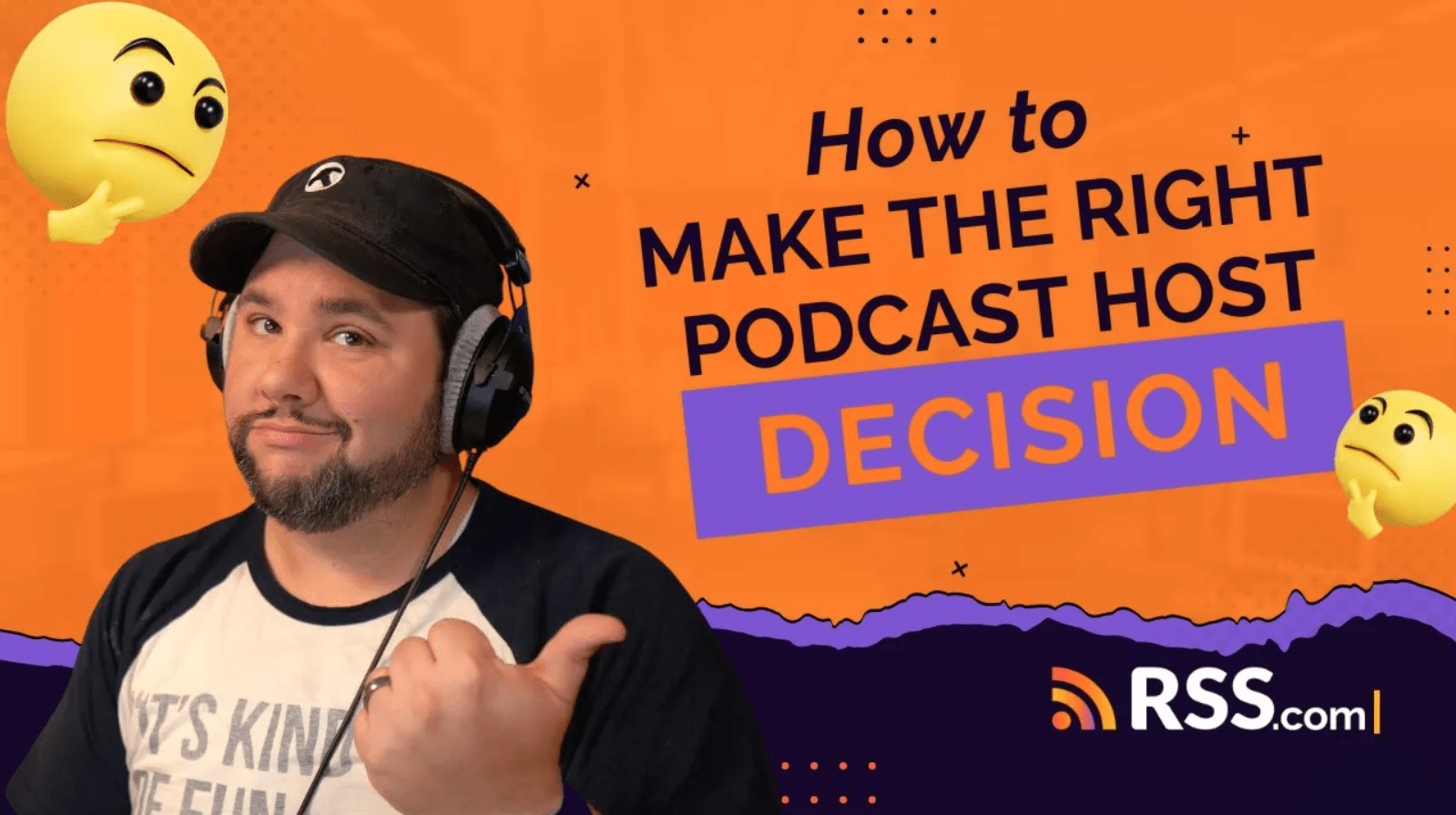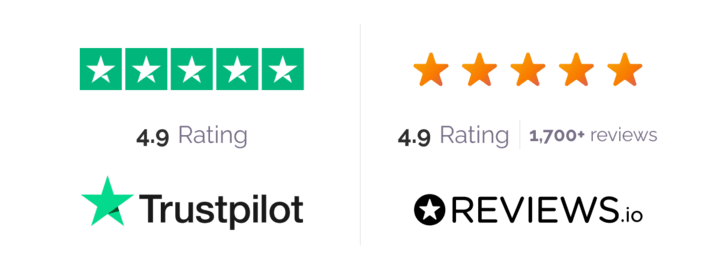With so many options, choosing a podcast hosting service, or podcast management platform can definitely feel overwhelming.
There are lots of options, and depending on your goals, you’ll need a host with the right set of features.
At this point, you’re probably wondering:
- How do you choose the best podcast host for your needs and budget?
- What features will you actually need now?
- What features will you need or want in the future?
My goal with this guide is to save you from signing up for multiple podcast hosting services as you seek to find one that exactly meet your needs, budget, and long-term goals for your podcast.
Don’t like reading? 🍿 Watch the entire guide below! 👇
🤔 What Should You Be Looking for in a Podcast Hosting Platform?
Podcasters of every level should expect that their podcast host will:
- Make it easy to start, grow and promote your show
- Provide different pricing plans that meet different needs and budgets
- Provide analytics for your podcast
- Offer monetization options to help you make money
- Provide you with tools to promote and distribute your podcast to listening apps like Apple Podcasts, Spotify and more
Now that we’ve discussed what you’ll need at a basic level, let’s dive into what makes the top podcast hosting platforms different.
The Best Podcast Hosting Services in 2024
1. RSS.com

RSS.com has quickly become one of the most popular podcast hosting platforms for new and more established podcasters due to its low pricing, long list of features and outstanding customer support.
With RSS.com, the bottom line is that you’ll get everything you need to start, track, promote and make money from your podcast for an unbeatable price.
A few of RSS.com’s best features include:
- Automatic and guided distribution of your podcast to Apple Podcasts, Spotify, Amazon Music and other major podcast directories.
- Free episode transcripts that you can use to promote your show.
- The ability to convert your audio-focused episodes into videos and upload to YouTube directly from your dashboard.
- Detailed podcast analytics to help you understand your audience.
- Free website for your podcast.
- The ability to host multiple shows from the same account.
- Extremely easy to use – new shows can be up and running in around 5 minutes.
- Monetization options including sponsorship opportunities, Apple Podcast Subscriptions integration, and Dynamic Ad Insertion (DAI) for approved shows.
- Removal of your email address from your public RSS feed to protect your privacy and prevent unwanted email spam.
- The ability to add collaborators (Admins and Analysts) to enhance how you manage your podcast.
RSS.com offers the absolute best value for your money and the best part is you can start for free, add an episode and explore all of the features without paying a dime.
Simplified Podcasting
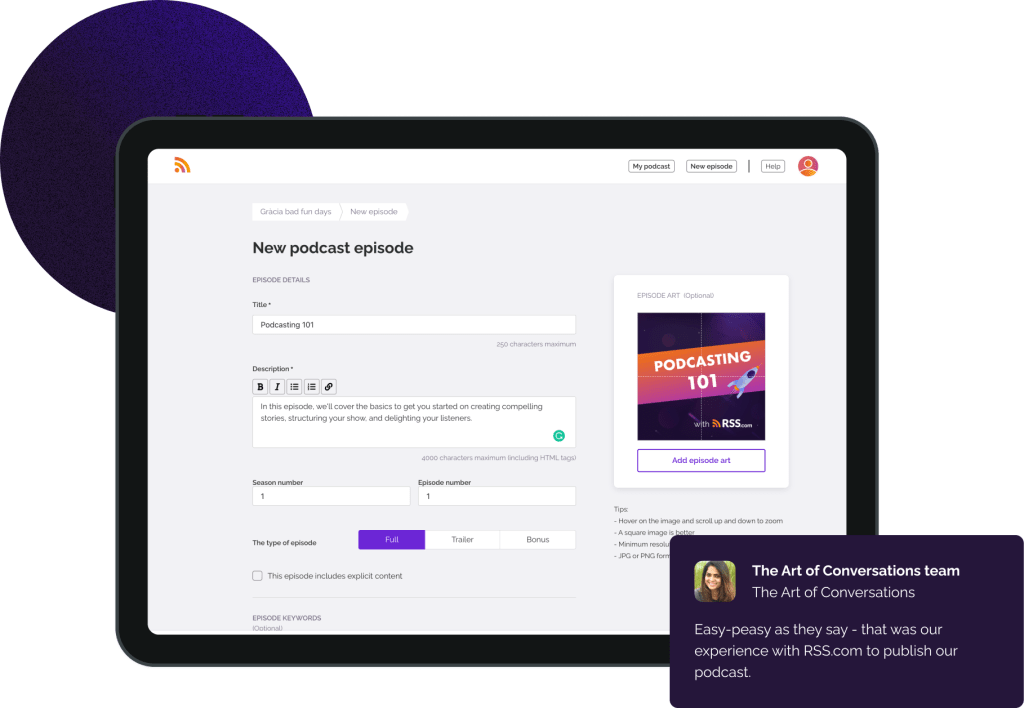
RSS.com allows podcasters to easily manage their shows with its simple, intuitive interface that can be accessed on desktop, smartphones and tablets.
RSS.com is so easy to use that new shows can be up and running in less than 3 minutes. Check out the video below to see how easy podcasting can be!
RSS.com gives all of it’s users a free podcasting website that’s automatically updated with your latest episodes.
You can customize your podcast’s website with cover, episode and chapter art as well a show description and links to an external website and or donation platform.
Auto-Submission of Your Podcast to Spotify and Apple Podcasts
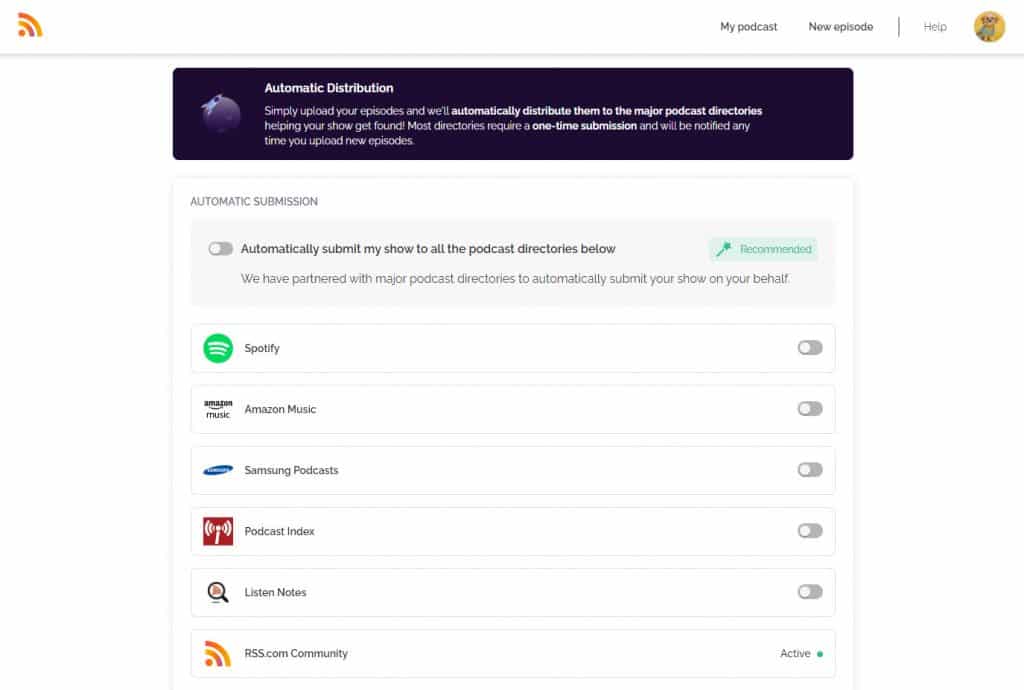
The easiest way to get your podcast in front of new followers and fans is to submit it to the major podcast directories.
One incredibly valuable feature that RSS.com has that top competitors like BuzzSprout don’t is automatic distribution to the top podcast directories like Spotify, Apple Podcasts, Amazon Music and more.
What is automatic distribution? It simply means you sync your account and all your episodes will be automatically distributed to these top directories.
Free Episode Transcriptions
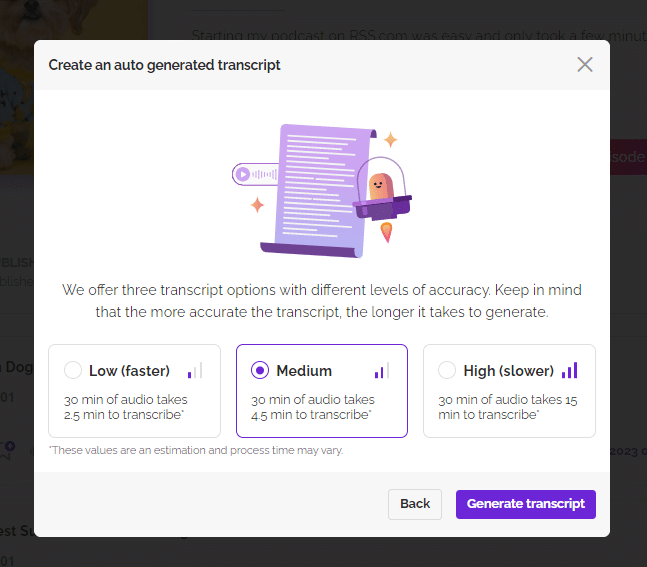
Another useful feature that many podcast hosting platforms charge for but that RSS.com offers for free is episode transcriptions.
You can use transcripts to not only make your show more accessible but more visible. When you publish your transcripts as notes or a blog post, you give search engines like Google text to crawl which can help your show surface in Google Search.
✨ Episode transcriptions are an easy way to increase you show’s visibility and engagement!
Cross-Platform Analytics

Understanding your audience is key to improving and growing your podcast. With RSS.com’s Podcast Analytics, you’ll get access to:
- Total number of subscribers for the month
- Number of all-time downloads (including how many downloads there were today, yesterday, this month and the previous month)
- Your top five episodes
- Where people are listening from geographically
- Device trends over time
- The app used to listen
- Heatmap showing the most popular listen days and times for your show
Improve engagement with each episode and grow your audience with statistics and insights using RSS.com’s Podcast Analytics.
Easily Convert Your Audio Podcast Episodes into Videos
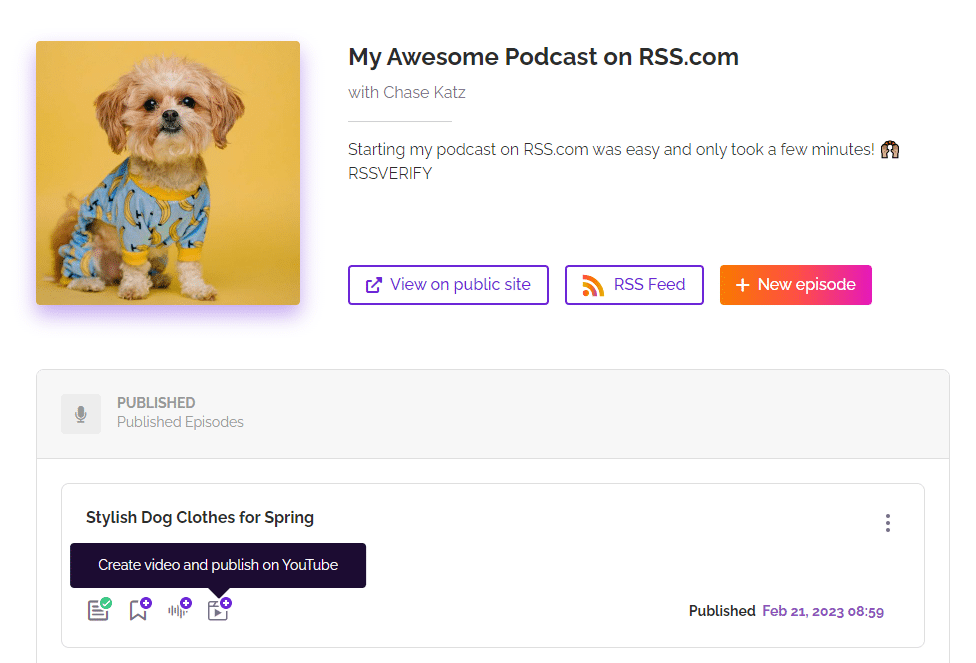
RSS.com provides 1-click audio-to-video conversion of your podcast episodes and also allows you to sync your channel for automatic publishing to YouTube.
Embeddable Podcast Player
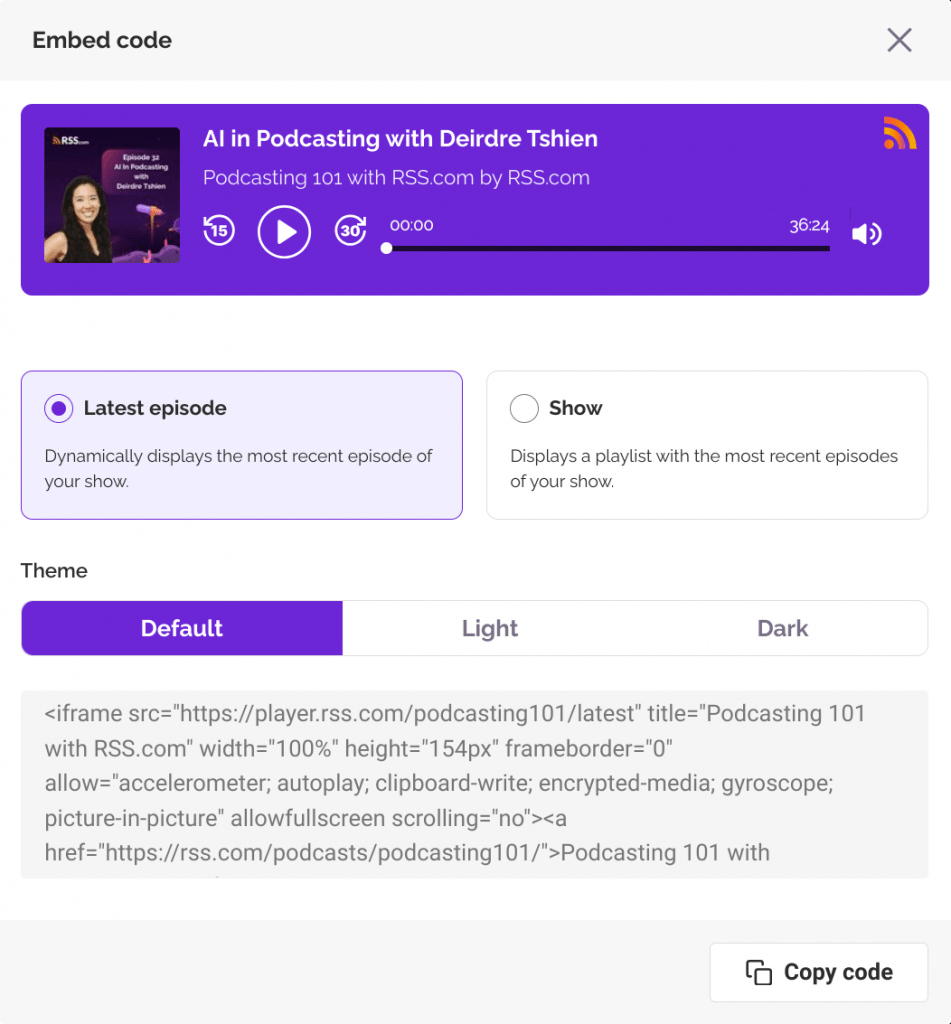
RSS.com offers a customizable embeddable podcast player so you can embed your episodes directly into your blog posts or website to attract more listeners and fans. You can embed a single episode or even your entire show!
PROS
- Ability to add and manage multiple podcasts through one account.
- Easy to use interface. You can set up a new show in a matter of minutes. Publishing new episodes is simple and intuitive.
- Unlimited episodes.
- Free episode transcriptions.
- Unlimited downloads.
- Cross-platform analytics that allows you to better understand your audience.
- Easily convert your audio episodes into videos
- Automatically published your converted episode files to your YouTube channel
- Dynamic Ad Insertion (DAI)
- Monetization options via Apple Podcasts Subscriptions.
- Free, beautiful public website for your show and episodes that’s updated automatically.
- Episode scheduling.
- Ability to add custom cover art to your public profile pages and episodes.
- Automatic creation and update of a fully-compliant podcast RSS feed compatible with all major podcast directories including Spotify, Apple Podcasts, Google Podcasts, Amazon Music and more.
- Automatic and guided distribution of your show and episodes in all the major podcast directories.
- Annual plans that allow you to save 20% on Podcast Hosting.
- Automatic show distribution to PodcastIndex, and Listen Notes.
- Educational discounts. Students and teachers receive a 60% discount on monthly pricing. Learn more about Educational plans here.
- Community podcast directory for additional discovery and SEO visibility of your show.
- Unmatched customer service and support.
- Episode player embed feature for easy sharing and promotion of your episodes.
- Easy, 1-click social media sharing of your show and episodes on Twitter, Facebook, LinkedIn, and Pinterest.
- Lock tags to minimize the possibility of unauthorized copies of your RSS feed.
- Ability to add donation and website links to your public podcast website.
- Removal of your email address from your public RSS feed to enhance privacy and eliminate spam.
- Option to add Admins and Analysts to your podcast to simplify the management of your show.
- The option to recommend up to six other podcasts right that will be prominently displayed on your public RSS.com website.
CONS
- Unlike some podcast hosting providers, RSS.com doesn’t have an app that allows you to record your show and publish episodes instantly.
- Not all Podcasting 2.0 tags available at this time.
- Customer Support and UI only available in three languages and via email.
- RSS.com does not offer WordPress plugins.
- RSS.com does not offer unlimited free plans.
- RSS.com does not have a mobile app.

2. Blubrry

What draws some podcasters to Blubrry Podcasting is PowerPress – their plugin for WordPress. Others are drawn to the fact that they have been offering podcasting services for more than 15 years.
PROS
- Podcast statistics for every pricing tier (advanced analytics come with an additional fee)
- Unlimited bandwidth
- Embedded podcast player for your website
- Free WordPress site and PowerPress plugin
- Private podcasting options
- Free file migration
- Podcast distribution to all networks and directories
- Monetization options via an affiliate program and “in-house” advertising program.
CONS
- For the $12/month plan (the cheapest Blubrry offers) you only get 100MB of monthly storage. Even at the most expensive plan on their website ($80/month) you only get 1,000 MB of monthly storage!
- Credit card required for free trials
- Dashboard and user interface didn’t feel as user-friendly as other platforms
The Downsides to Blubrry Explained:
As choosing a podcast host is a big decision, many new podcasters appreciate a free trial to get a feel for the service and features of a platform. On their website, Blubrry doesn’t offer a free trial – however, after scouring the web, we are able to find a free trial link.
After setting up our account, it took us some time to figure how to upload an episode – the user interface wasn’t what we’d call intuitive.
Overall, Blubrry’s dashboard felt a little overwhelming and could be disconcerting to a new podcaster who is also learning how to start and grow a podcast.
3. Spotify for Podcasters

Spotify for Podcasters (formerly Anchor) is a free option that many new podcasters consider when starting a new podcast.
The truth is that Spotify for Podcasters is a great option for those who are not fully invested in their podcast.
Spotify for Podcasters is not a good option if you plan on:
- Starting a podcast for your brand or business
- Plan on turning your podcast into a business in the future
While “free” may sound like a good deal, we suggest performing more research on the pitfalls and limitations of using a free service like Spotify for Podcasters.
When you pay for a podcast hosting service, you are in full control of ads, your content, and your podcast on the major directories like Apple Music, Amazon Music, Google Podcasts, etc.
Ideal for: a brand new or uncommitted podcaster still testing the waters.
Spotify for Podcasters Review – Should You Host Your Podcast with Spotify?
Creating an account and uploading an episode is straightforward. We appreciated the ability to share new episodes to Facebook or Twitter, copy the episode link, or convert the episode into a blog post. The app is intuitive and has useful features.
However, hosting your podcast on Spotify for Podcasters isn’t without its downsides.
PROS
- Intuitive app
- Unlimited hosting and episodes
- Analytics from Spotify
- Automatic distribution to Spotify, Apple, Pocket Casts, Overcast and others
- Monetization options
- In app recording and editing features
- Cover art creator
- Music integration: Add any full tracks from Spotify to your episodes
CONS
- Fees for Anchor sponsorships are higher
- Your show could be removed without warning
- Your content could be used to promote/advertise Anchor without consent or compensation
- Some users have complained that they can’t gain direct access to their analytics on Apple or Google Podcasts because of the automatic distribution
- Their stats are mediocre at best, especially considering that they have direct connection to Spotify and know the demographics of listeners!
The Downsides to Spotify for Podcasters
If you get sponsored, expect to pay a lot more in fees. For example, Spotify for Podcasters Sponsorship charges 30%!
This means if you earn $10 with Spotify, they will take $3, and a $0.25 processing fee as well as a $0.25 cash out fee leaving you with just $6.50.
While it is true they state you own the rights to your content, they also explicitly state in their terms and conditions that by using their platform you grant them the right to edit and modify your content and use it to promote and advertise their company and Spotify.
They also state that they have the right to remove your content without warning at their own discretion, and that they “have no responsibility or liability for the deletion or failure to store any User Content maintained or uploaded by the Services.”
As many podcasters have so aptly put it – If you’re not paying for the product, you are the product.
Because they are a free service, customer support is not as robust as you’d receive with another podcast host, and technical issues can go unresolved for long periods of time.

 |  | |
|---|---|---|
| Privacy and Security | Enhanced privacy and security features to protect your content and data. | Standard privacy and security features. Want proof? See this recent article. |
| Control Over Your Content | You maintain full full control over your content. | Your podcast can be deleted without prior notice. Want proof? See this thread and check out this article. |
| Monetization Options | Multiple monetization options including Dynamic Ads Insertion, Apple Podcasts Subscriptions, Sponsorship opportunities and Podcasting 2.0 Value4Value. | Limited monetization options only through ads. |
| Advertising Control | Full control over ads and sponsorships. | Ads are controlled by Spotify, with less flexibility for the podcaster. |
| AI Features | Convert your audio episodes into engaging videos using our PodViz technology and enjoy free episode transcripts in all plans. | No transcripts or YouTube integration. |
| Value | Competitive pricing for advanced features and dedicated support. | Free, but with limited features and support compared to paid services. |
| Customer Support | Dedicated customer support with quick response times. | Basic support. Long waiting times. |
Pro Tip: Already using Spotify for Podcasters and want to switch ? Here’s how to move your show to another host. ➡️ Move your show to RSS.com and get a full 6 months FREE.
4. BuzzSprout

Buzzsprout’s plans range from $12/month for up to 3 hours of audio uploaded per month to $24 per month for up to 12 hours uploaded per month. Optional add-on features for paid accounts include MagicMastering – audio filtering, and transcription at $0.25/minute.
Signing up for an account and uploading an episode for free was simple and intuitive. With that said, we found their monthly subscription rates are way too high for what you get for the money.
Ideal for: an independent podcaster, serious about podcasting.
PROS
- Analytics
- Embedded podcast player for your website
- Ability to manage multiple podcasts under one account
- Unlimited team members can be added to your account
- Free website for your podcast (ads displayed on free accounts)
- Visual Soundbite for sharing your podcast episodes on social media sites
- Monetization options (affiliate program, sponsorships via Popcorn, and audience support programs)
- Free plan includes uploads of up to 2 hrs each month
CONS
- If you have a free account, Buzzsprout will display ads on your public podcast page.
- Free accounts are limited to just two hours of audio a month, and episodes are deleted after 90 days
- Buzzsprout doesn’t offer annual plans. They are strictly month-to-month.

Buzzsprout’s Audience Support Programs
Buzzsprout provides monetization options that allow your listeners to support your show through accounts you’ve set up on Patreon, Podfan, Buy Me A Coffee, Paypal, and Cash App integrations.
In theory it sounds great, however to find the “Support Podcast” button, visitors listening to your episodes need to click a tiny icon hidden in the bottom right of your player to expand and display this feature (see above screenshot).
 |  | |
|---|---|---|
| Content limitation | Your episodes stay hosted without any time limitations. | On the free plan, your episode will only be live just for 90 days. |
| Bandwidth | 1 TB / month | 0.5 TB / month |
| Value for Money | RSS.com offers competitive pricing and features, from $4.99 to $19.99 | Buzzsprout’s paid plans range from $12 to $24 per month with no discounted annual billing. |
| AI features | AI features like, create audio to video or automated transcripts, comes included on our plans. | AI features range from $6 to $30 per month plus the paid plan. |
| Customer Satisfaction (Trustpilot) |  |  |
Pro Tip: Already hosted with Buzzsprout? Here’s how to move your show to another host. ➡️ Move your podcast to RSS.com and get a full 6 FREE months!
5. Castos

Castos offers both monthly and annual plans which begin at $29/month and $290/year respectively. Similar to Blubrry, they have a WordPress plugin which allows you to manage your podcast, from inside your WordPress dashboard.
Where they stand out is they are one of the few podcast hosts to offer plans that include video hosting. However, their big features also come with larger price tags.
PROS
- Unlimited number of podcasts – each podcast gets its own RSS feed.
- Unlimited episodes can be uploaded each month.
- Private subscribers option (individuals receive a password to listen to a private feed).
- Free public website for your podcast.
CONS
- Episodes are limited to a 4 hour duration limit.
- The hosting fees are high compared to other hosts, and only the most expensive plan has video hosting.
Castos Podcast Hosting Review
For the lowest paid plan ($29/month) you get 100 private subscribers. At the $690/year pricing tier your private subscribers can be increased to 250, your show can be video published to YouTube and you get Headliner Audiograms for your episodes.
The $1490/year pricing tier gets 500 private subscribers, all of the above mentioned features, advanced analytics and video file hosting.
For podcasters with multiple shows, they may be tempted to purchase one of these plans. But in our opinion, it’s a very large fee if you only have one show.
On the other hand, if you want to have a private show that you sell access to, such as in a course or coaching membership, paying for private hosting may be worth it to you as well.
There is a free 14-day trial on the Castos website with no credit card required.
When you sign up, you get the option to either manage your show with their dashboard, or use a WordPress plugin to sync episodes from your WordPress website to Castos.
The Castos dashboard was reminiscent of the BuzzSprout dashboard, and creating an account and uploading episodes was pretty easy. You can also integrate your podcast with Spotify and Amazon Music directly from your Castos account.
Again though – we couldn’t help feeling that the price was just too high for the features offered.
6. Libsyn
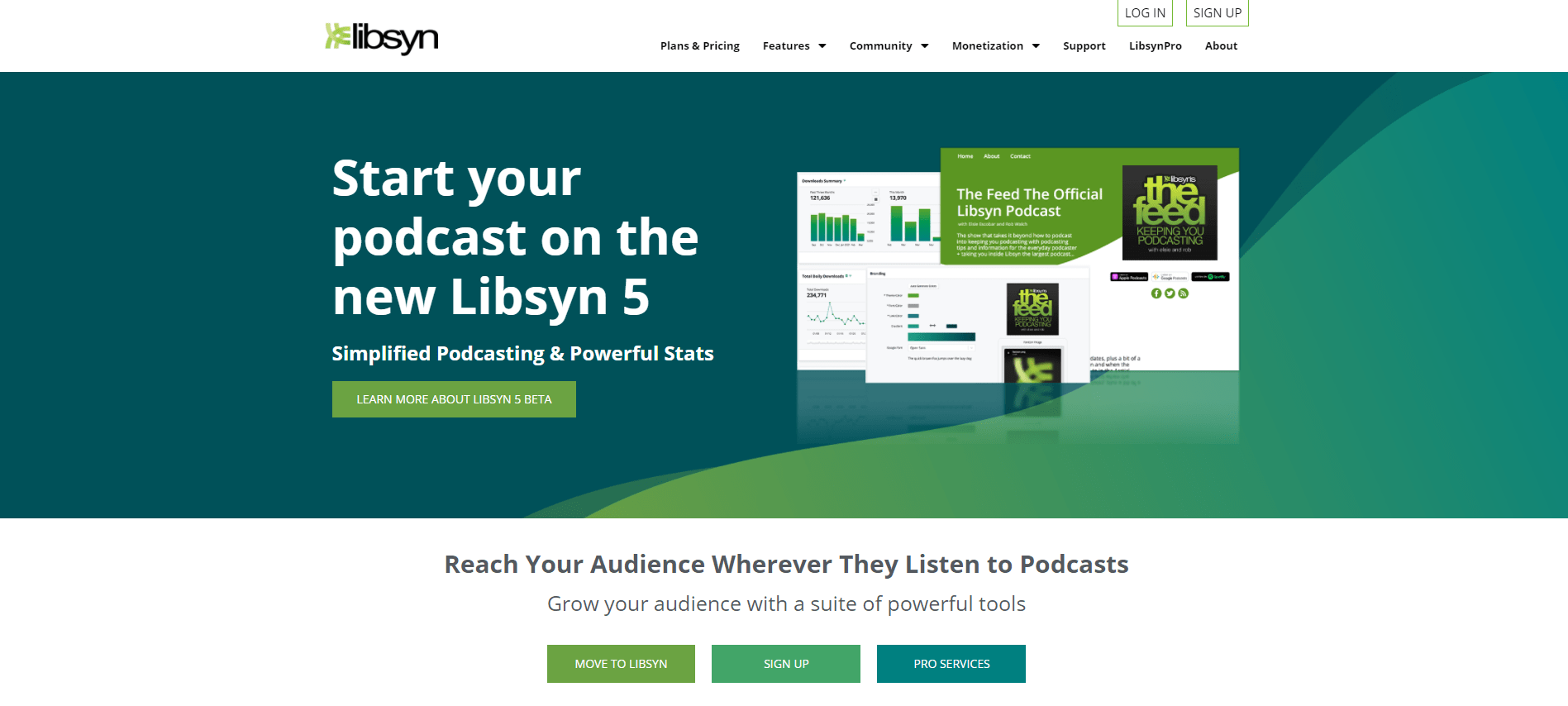
Libsyn’s claim to fame is that they host more than 75,000 podcasts worldwide, and packages start at just $5/month.
The question is – what features do you get for that $5/month? Let’s explore.
PROS
- Inexpensive hosting. Plans start at just $5
- An RSS feed to submit to podcast directories.
- Public website for your show. You can also use your own domain for an additional $2 per month.
- Listing on Libsyn’s podcast directory.
- WordPress plugin for publishing episodes on WordPress
- Embed Codes to add episodes to your website
CONS
- At $5 you only get 50MB of storage/month (single episodes can be bigger than that!)
- Analytics aren’t included for the $5/month plans.
- Their app is restricted to the $20 and up plans.
- Your podcast cover art counts towards your monthly storage.
Libsyn Podcast Hosting Review
If you have an episode that is an hour or longer, you will hit storage quotas fast. And, if you have multiple episodes you want to load in a single month, you’ll need a more expensive plan as well.
The most expensive plan that is publicly available is $40 per month and it features 800 MB of monthly storage. While these numbers reset each month for how much you can load, we’re betting you will find it’s far too easy to hit their maximums once you start getting serious about podcasting.
Analytics begin at the plans that are $15/month and up. Other features such as Double Opt-In Advertising and MyLibsyn Premium Paywall aren’t available until you reach the $20/month plan. The Paywall feature allows you to charge premium subscription fees for your podcast content.
In terms of loading and deleting episodes, as well as creating your account, Libsyn is easy enough to use. Again though, we can’t help but gasp at their storage limitations.
7. Podbean
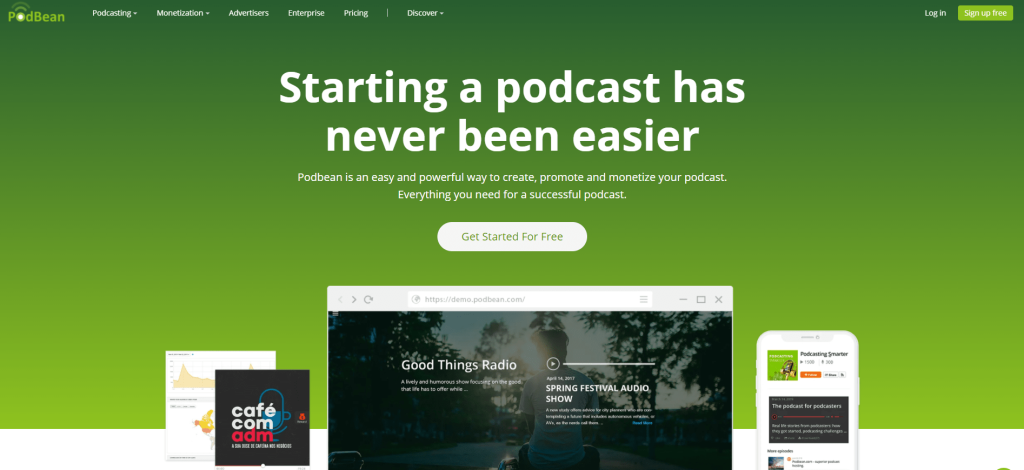
PodBean offers both free and paid accounts to podcasters. They also offer a unique feature with their unlimited plus and business plans known as the Patron Program.
The Patron Program is a paywalled RSS feed that allows you to charge your listeners to receive access to bonus content that is not available publicly.
PROS
- PodBean offers a free podcast plan that includes 5 hours of total audio, and 100GB of monthly bandwidth.
- Mobile app and podcast player.
- Embeddable players to add your episodes to websites.
- A public podcast website with free themes.
- Podcast RSS Feed.
- Basic stats for your podcast.
CONS
- Limitations on storage and bandwidth for free accounts.
- Other podcasters have complained of glitches with their website, and difficulty adding their RSS feed to podcast directories.
- Only business plans have the ability to remove Podbean branding from podcast pages.
Podbean Review
Paid accounts begin at $9/month (paid annually) or $14/month (paid monthly). As soon as you begin paying you get additional features including:
- Advanced Stats such as “where your audience comes from [and] how they play your episodes”
- Unlimited storage and bandwidth (“subject to Podbean’s Fair Usage Policy)
- Pro Themes for your public podcast web page
- Custom design options
- Opportunities to monetize with Ads Marketplace and Premium Sales
For even more features such as access to their Patron Program, and/or PodAds monetization opportunities as well as video hosting, you will need an Unlimited Plus plan (starting at $29/month) or a Network plan starting at $79/month.
Business plans also gain access to private podcasts, groups, live chat support, and the Podbean Pro App.
Sign up was easy, and accessing the dashboard was simple as well. One feature that was interesting was the automatic social share option. You can connect your Facebook, Twitter, and LinkedIn accounts to automatically share new episodes upon their release.
You can also record and publish an episode from within the app for the platform. However, again we highly recommend recording with a podcasting microphone into a program like GarageBand or Audacity, and then uploading it for better audio quality.
8. Simplecast
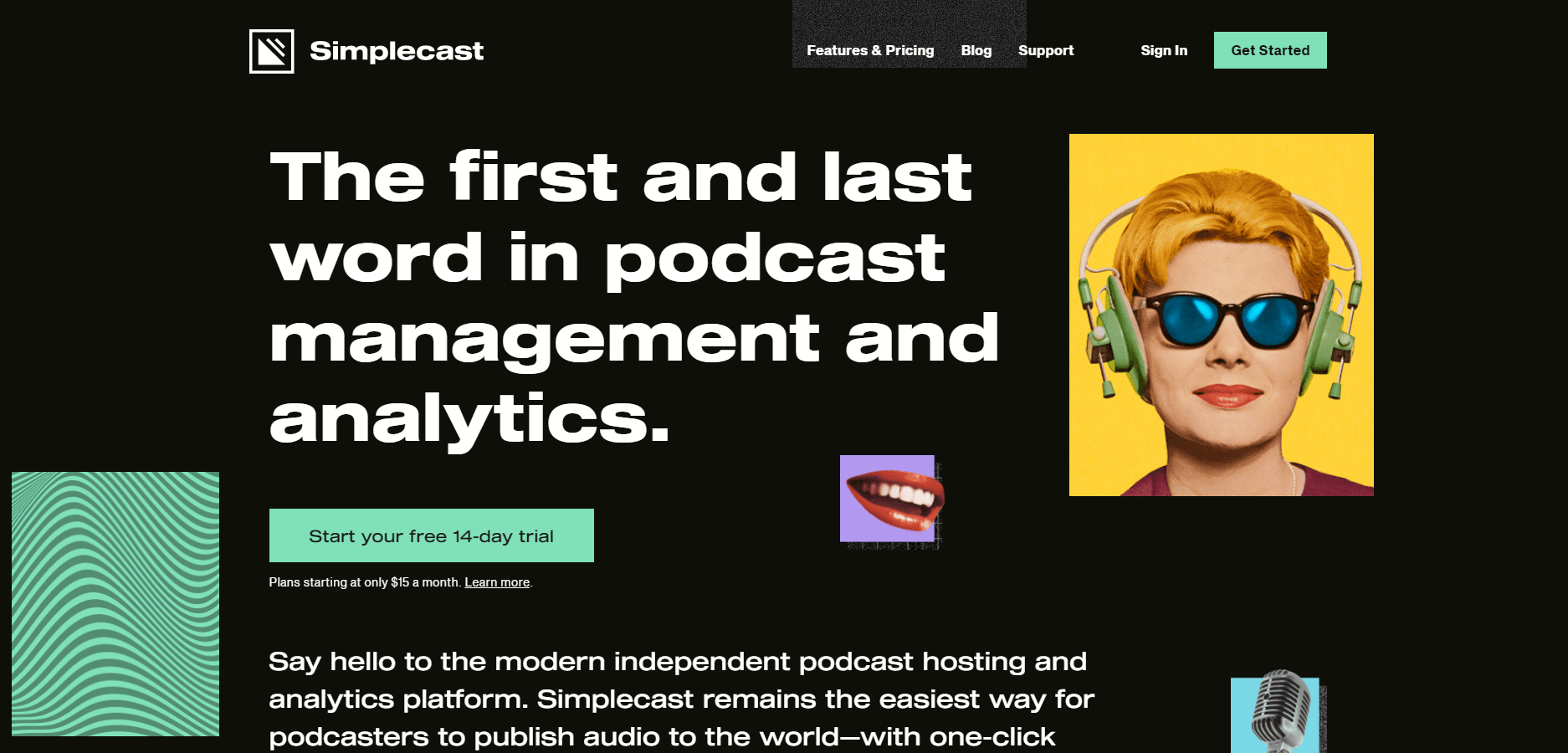
Simplecast touts itself at the best platform for podcasters who want to track their analytics. Unfortunately, you will need to choose the higher pricing tiers to gain access to them as their lowest priced plan only delivers “Basic analytics.”
Simplecast’s free trial is for 14 days, and that will give you carte blanche to explore it’s interface and features. That is until you want to actually publish an episode at which point, you’ll need to select a paid plan. Plans begin at $15/month if paying month-to-month or $13.50 if paying annually.
PROS
- Signing up doesn’t require a credit card.
- Paid plans include unlimited uploads and storage.
- Basic analytics included with paid plans.
- Embeddable podcast player to share episodes on your website.
- A public podcast website for your show.
- Podcast RSS feed.
CONS
- The free trial isn’t really a full trial – you can’t upload an episode until you pay.
- With the basic plan you are capped at 20,000 downloads per month.
Simplecast Podcast Hosting Review
If your show goes viral and takes off, having the basic plan can be problematic!
The next tier jumps to $35 monthly ($31.50/month if paying annually), and it only permits 50,000 downloads per month. Finally, their growth plan is $85 monthly ($76.50/month if paying annually), and it allows for up to 120,000 downloads per month.
While the platform seems easy to use, we can’t help feeling like the pricing structure encourages podcasters to stay small lest they end up having to pay huge podcast hosting fees.
Call us crazy, but we don’t think podcasters should get penalized for their shows gaining popularity!
9. Spreaker
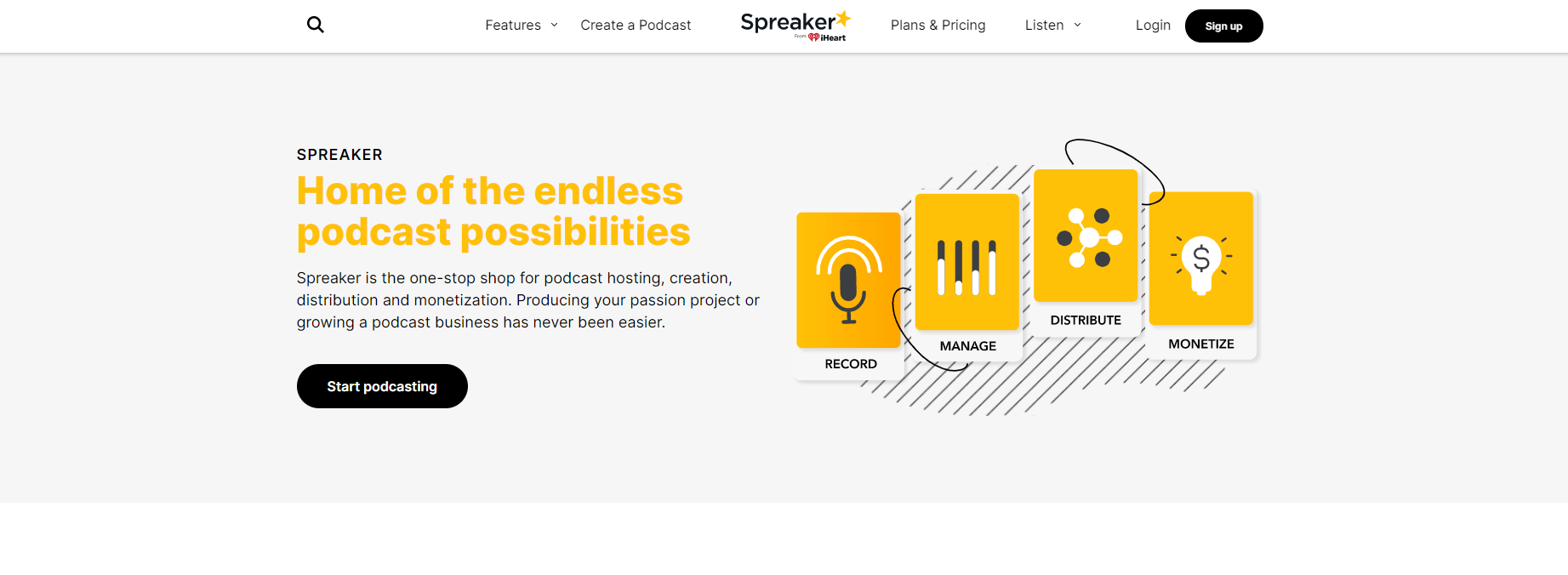
Spreaker is owned by Voxnest, who in October 2020, announced that they were going to be acquired by iHeartMedia (aka iHeartRadio).
Spreaker is one of the few hosts that allows podcasters to live broadcast their show, making them ideal for call-in style shows.
PROS
- Offers free accounts with limited features. Signing up doesn’t require a credit card.
- Free plans can upload up to 5 hours of audio content and/or 10 episodes – whichever comes first.
- Paid plans have live podcasting capabilities.
- Ad revenue sharing and dynamic ad insertion monetization opportunities with paid accounts.
- Ability to manage multiple podcasts through a single account.
CONS
- Limited features, for the “Free Speech” and the “On-Air Talent” plan at $7/mo
- Spreaker customer complaints on G2 included:
- “Worst Customer Service. Hands down.”
- “Refuse to refund an auto-payment made in error to 2 year customer.”
- “They will bill you a renewal without warning for a year in advance and then flat out will not refund the pre-payment, even if you have moved your podcast a year ago! “
 |  | |
|---|---|---|
| Content limitation | Unlimited storage for your podcast episodes. | Free plans can upload up to 5 hours of audio content or 10 episodes, whichever comes first. |
| Episode Length Limits | Freedom to create episodes of any length. | Imposes duration limits on episodes. |
| Advanced Analytics | Access to advanced analytics without the hefty price tag. | Advanced analytics are only available with the most expensive plan. |
| Feature-Rich Packages | Affordable plans offer advanced analytics, audio-to-video conversion, and a public website. | Full feature access costs $50 to $250 per month, plus the paid plan. |
| Customer Satisfaction (Trustpilot) |  |  |
Spreaker Podcast Hosting Review
Spreaker’s paid plans begin with their “Broadcaster” plan at $20/month. At this price point, users gain access to the following features:
- Up to 100 hours of audio storage.
- Unlimited episodes and listeners.
- Episode scheduling.
- Up to 45 minutes of live podcasting with a listener’s chatbox to engage with your audience.
- Basic statistics.
- Ad revenue sharing and dynamic ad insertion monetization opportunities.
Spreaker’s “Anchorman” plan starts at $50/month and gives you access to up to 5 hours of live podcasting.
They also offer a “Publisher” plan at $250/month. Both the “Publisher” and “Anchorman” plans provide “Full Statistics.”
10. Transistor.fm

Similar to RSS.com’s Podcast Networks Plan, Transistor is designed for businesses and networks that want to host multiple podcasts under one account.
Pros
- Ability to host unlimited podcasts and add unlimited team members under one account.
- Intuitive dashboard for managing multiple shows.
- Built-in website builder for each podcast.
- Advanced analytics and insights.
- Dynamic ad insertion, show notes and YouTube auto-posting for monetization.
- Option to have private podcast subscribers.
Cons
- No free plans available.
- Transistor limits your downloads.
- Limited to English, Spanish and Portuguese languages.
- Expensive when compared to other platforms
- No unlimited plans.
 |  | |
|---|---|---|
| Value for Money | Competitive pricing and feature-rich plans ranging from $4.99 to $19.99. | Plans start from $19/mo for Starter, $49/mo for Professional, and $99/mo for Business. |
| Downloads limitation | Unlimited downloads for wider reach. | Monthly download limits of 10,000, 50,000, and 150,000 respectively for each plan. |
| Enhanced flexibility | AI features like, create audio to video or automated transcripts, comes included on our plans. | AI features range from $5 to $20 per month plus the paid plan. |
| Customer Satisfaction (Trustpilot) |  |  |
Transistor Podcast Hosting Review
While Transistor makes it easy for businesses and networks to host and manage multiple podcasts from one account, the biggest downside is how expensive it is. Sure, you could save some coin and opt for the annual Starter plan. But, even with the savings it still comes in at just over $15 a month, and you’re limited to 20,000 monthly downloads.
Even with their most expensive plan at $99 per month, you’ll be limited to 250,000 monthly downloads. Transistor.fm is good at the hype, but unless you have some specific needs, there’s no reason for you to pay $19-99/month when you can pay $15/month.
Bottom line – though the interface is easy to use and they have some similar bells and whistles, it seems like you can get more bang for your podcasting buck with RSS.com.

How to Choose a Podcast Hosting Platform That Perfectly Meets Your Needs and Budget
We’ve covered a lot in this post, and we understand you have options when choosing a podcast host.
Here are a few steps to take to assist you in making your choice:
Step 1. Open a word processing document or get out a pen and paper.
Step 2. Write down what your short-term and long-term goals are for your show.
Step 3. Write down how often you plan to release episodes, and how long you intend for them to be.
Step 4. Decide if you plan on hosting just one show or multiple shows?
Step 5. Decide if you plan on video podcasting?
Step 6. Write down your budget.
Let your answers help guide who you ultimately choose as a podcast host. For example, if video hosting is a top priority, many options on this list will be instantly removed.
Also, you can always take advantage of free trials and offers to test the features and functionality of the podcast hosts on this list before making your final decision.
With a little searching, there are coupon codes and links for free trials for nearly every podcast host listed above.
In fact, RSS.com has a coupon code for a full free month. Just use RSSFREEMONTH at checkout.

